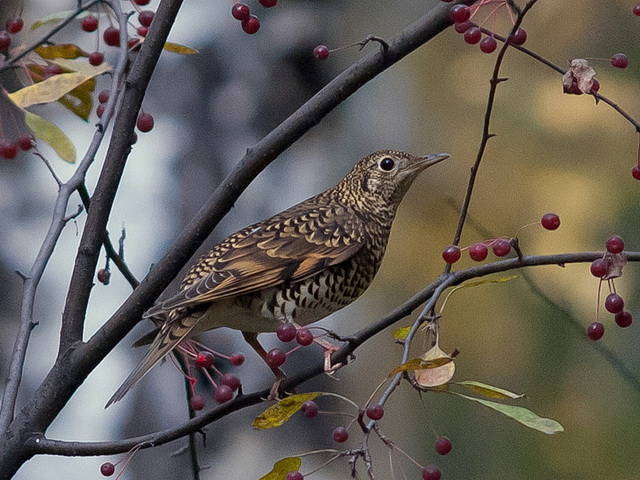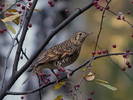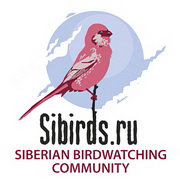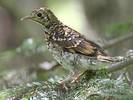search
classification
|
basic information
|
video
|
reports |
White's Thrush
Zoothera dauma (Latham, 1790)

|
 adult bird
|
|
|
2015-09-27
Novosibirsk |
© Andrey Chernykh
|
|
Description
The White's Thrush is a largest of Kazakhstan's thrushes, larger than the Mistle Thrush. The upperparts background is golden-buffy; the underparts background is golden-yellowish, lighter on the abdomen. The full body and head have the large black spots of mostly crescent form, these spots form the scaly pattern. Bird in flight shows the pale corners of the of tail. The underwings coverts are white with the broad black longitudinal band. From above the yellow longitudinal bands are appreciable on the wings. Males and females are similar. The seasonal differences of plumage are insignificant. But there are the individual variations of the background's color from more golden to more dark-olive. Tail is quite short. Juveniles are similar on adults but the dark scaling on upperparts is alike to the cross-cut strips; the underparts' spots are rarer and rounder in form. The White's Thrush moves on ground not by jumps as other thrushes but at a foot-pace. Weight 100-200 grams, length 27-30, wing 15,8-17,6, wingspan 44-48 cm.
Biology
The White's Thrush is very rare breeding migrant, or in some places passage migrant. It inhabits the old spruce forest with the wind-fallen trees and brunches; not far from rivers or streams at 1500-2680 m. On migration it visits the deciduous forests, groves, bush thickets. It appears in April – end May. It breeds in separate pairs quite a far from each other. The singing is heard till mid-June. The nest is built in tree, most often in the fork of the trunk or in the base of large branch, at 2-4 m above the ground; or rarely on ground. The nest is roughly and large, larger than nests of other Thrushes; from the moss, lichens, twigs, dry leaves and ferns. As other on Thrushes the nest is braced by the wet soil and clay and is lined with rootlets, dry grass and fir-needles. Clutches of 4-5 eggs is in mid-May – early June probably, as the brood of four fledglings was discovered 7 July 1971 in Bolshoye Almatinskoye lake area, no adults were seen nearby. Two independent juveniles observed 13 July 1978 in Kungey Alatau, in upper reach of Chilik river. The White's Thrushes eat and feed the nestlings mostly by the brandlings, and also by spiders and different insects which are picked up only on the ground. On the whole much time it is on the ground, flushes heavy and loudly. It eats the berries. In autumn singles are recorded in the end of August – early October.
References






